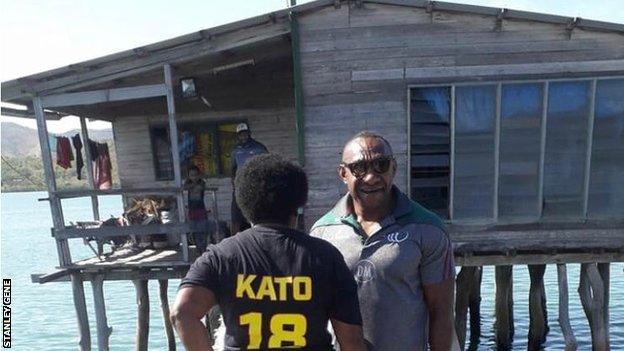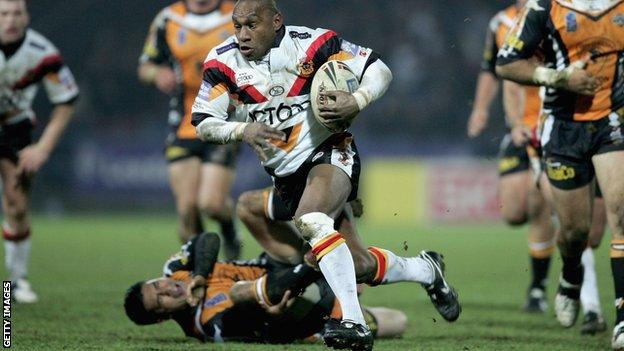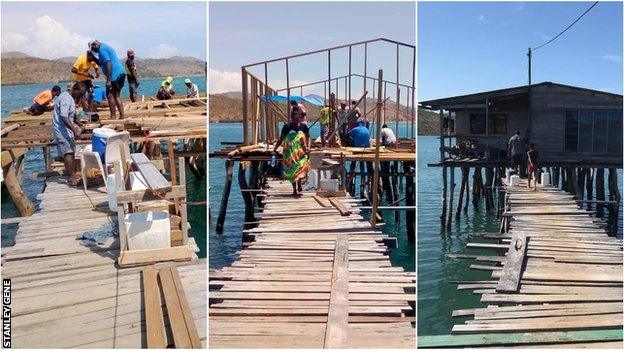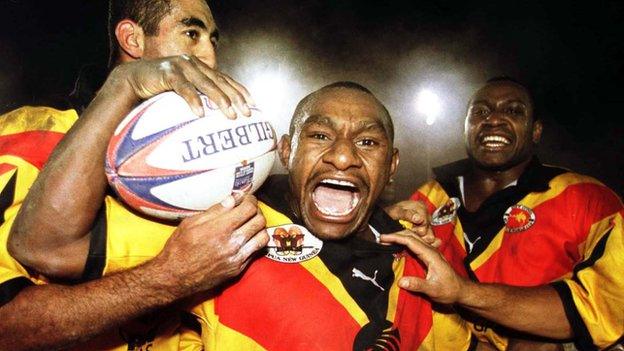PNG v Great Britain: Stanley Gene on how rugby league has helped light up his homeland
- Published

Stanley Gene's work in PNG saw him help have a house built for the mother of late Kumuls star Kato Ottio
Papua New Guinea v Great Britain Lions |
|---|
Date: Saturday, 16 November Kick-off: 07:30 GMT Coverage: Live on BBC Two from 07:00 GMT, repeat on BBC Red Button at 11:30 GMT, live text commentary on BBC Sport website; highlights on BBC Two at 16:30 GMT, repeat on BBC Red Button 20:00-23:45 GMT. |
Light. Water. Shelter. Salvation.
Rugby league has helped one of Papua New Guinea's most famous sons provide the means to achieve it all in his homeland.
Stanley Gene grew up in the highlands of the South Pacific nation living in a village with no running water and a hut with no electricity.
His success as a Super League cult figure in England ensured that changed for those who remained in Segu, more than 8,600 miles away.
The game, he said, also saved him from an almost inevitable life of crime.
"Rugby league gave me everything," the 45-year-old told BBC Sport.
"It helped educate me - the field was like going back to the classroom. It gave me confidence to talk and a language to speak.
"It made me become who I am. It gave me a family here in England, and never in my wildest dreams did I think that would have happened.
"I appreciate that to this day and it's why I like to give back. And there is a lot in PNG to help with."

Stanley Gene spent just one season with Bradford Bulls, winning the World Club Challenge trophy with victory over Wests Tigers
'I had to get running water'
As a player, Gene won a World Club Challenge with Bradford Bulls, helped restore Huddersfield to Super League following relegation in 2002 and had two spells with Hull KR, where he is revered as a club legend despite a spell with bitter cross-city rivals Hull FC.
Gene was also part of the Papua New Guinea side that pushed Great Britain to the brink before losing 32-30 the last time the Lions toured there 23 years ago.
His international career spanned 13 years and three World Cups.
But for all he achieved on the field, the greatest moment the game gave him was the ability to perform a simple, everyday task.
"The best thing I did in rugby league was going back to my village in 1997 and turning a tap on - seeing water come into the village and helping stop kids from going down to the river every morning," he said.
"Growing up there I used to run down from the little village of Segu, through the bush every morning with a stick to wipe all the morning dew from bushes as we went, just to get to the river for a cold shower or wash before school.
"We would also fetch water for drinking and by the time you got back you were full of mud again and just as dirty.
"That first year in England I saved about £200 or £300 because I just had to sort it out and get running water."
Ever since, he devoted himself to improving things in the Eastern Highlands Province of Papua New Guinea.
Gene returns to Papua New Guinea
'Kato Ottio's death hit me'
Having started out collecting discarded boots from team-mates and second-hand kit from the clubs he played for, Gene set up a charitable foundation which has helped fit out a science lab at the local school he attended, provide beds for a hospital and books for a library.
For almost 15 years, the foundation has regularly sent shipping containers packed with items, including computers, TVs and microwaves, back home while also overseeing electricity and water projects which have impacted the lives of thousands.
He deliberately kept his focus on the mountain region he called home so he could be hands on.
That was the case until tragedy struck the sport in 2018 with the death of PNG international Kato Ottio at the age of 23 after suffering severe heat stroke.
Ottio was to follow in Gene's footsteps and play Super League, having signed for Widnes Vikings after impressing at the 2017 World Cup.
He never made it to England, dying a week before he was scheduled to travel to the UK.
The centre had spoken of a desire to build a house for Ottio's mother with the money he earned from the move, and thanks to funds raised by donation pages set up by the Vikings and Canberra Raiders - the NRL club he was with in Australia - that dream was made a reality.
Gene also lent a hand in having the four-bedroom house on the water of Tatana Island, just outside of Port Moresby, built.
"I never had the privilege of meeting Kato, but when it happened it hit me because he lived with his mum without a dad, which was exactly like me," Gene said.
"I left the shores of PNG when I was 19. My mum was the breadwinner and naturally I wanted to provide for her.
"I built a little house for my mum and was proud. That was Kato's ambition as well and that hit me, I knew what that is like.
"What I did was be a bridge between Widnes and Kato's family. I'm so proud of what everyone did because he could have been playing for another 10 or 15 years, and the big thing was to get a roof over the their head."

It was Kato Ottio's dream to have a home built for his mother Joyce
Avoiding a life of crime
PNG is the only county in the world where rugby league is the national sport, and Gene has seen how harnessing the the power of the game can transform people's fortunes.
And he didn't need to come to England to learn that.
As a teenager, trouble in the ghettos of Goroka was never far away and clashes with police were a common occurrence.
Recruiting players from those ghettos to play in the Royals Police team helped quell trouble and enabled the community to deal better with crime.
"I could have been a hardcore criminal without rugby league; some of my mates went that way," Gene said. "I'd seen mates shot and car robberies - I was one of the boys back then, and the kids hated the police.
"But then the police team was formed and I was picked up by them and that made a big difference.
"Police officers sponsored players, I got a pair of boots and used to have meals in the barracks like I was one of them.
"Before, you would have kids being taken to the cells in police cars, then after that it was the police taking them to games."
The passion rugby league generates and obsession many have with the sport was highlighted in dazzling fashion as PNG co-hosted the 2017 World Cup, with home support spurring the Kumuls to the quarter-finals.
With the Lions returning after more than two decades on Saturday, Gene said there would be exciting scenes once again as people travel to the match from far and wide - a fact that he says highlights both the nation's enthusiasm for the game and struggles of the country.
"Rugby league helps put on a big, brave, happy I am face for PNG," Gene said.
"Behind that you see kids that struggle to get water, who walk hours to school and hours to this game."

Stanley Gene's career in England spanned 14 years, coming over with Hull KR in 1996, before going on to play for Hull FC, Huddersfield and Bradford Bulls before second spell at Rovers was followed by a stint with Halifax